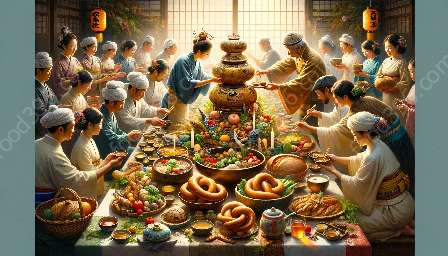Commensality, food rituals, and food culture are closely intertwined aspects of human social and cultural life, reflecting the way people interact with food. In this comprehensive guide, we will delve into the meaning and significance of commensality, explore the role of food rituals and symbolism, and trace the evolution of food culture and history.
Commensality: Sharing a Meal, Sharing Lives
Commensality is the act of eating together, sharing food, and engaging in social interactions around the dining table. It extends beyond mere sustenance, encompassing the social, cultural, and symbolic dimensions of communal eating.
At its core, commensality fosters connection, communication, and conviviality among individuals and communities. It serves as a platform for building relationships, expressing hospitality, and reinforcing social bonds. Whether it's a family meal, a communal feast, or a formal dining event, the act of sharing a meal creates a shared experience that transcends the simple consumption of food.
The Psychology of Commensality
Psychologically, sharing a meal with others has profound effects on human behavior and emotions. It promotes a sense of belonging, trust, and cooperation, leading to the formation of strong social ties and a heightened sense of community. Moreover, the act of communal eating triggers the release of oxytocin, often referred to as the 'bonding hormone,' which further strengthens interpersonal connections.
Cultural Significance of Commensality
Commensality holds diverse cultural meanings and practices across different societies. From the elaborate communal meals of traditional cultures to the modern-day family dinners, each cultural expression of commensality reflects unique values, traditions, and etiquettes associated with food sharing.
Food Rituals and Symbolism: Unveiling Culinary Traditions
Food rituals and symbolism are intrinsic to the human experience of consuming and preparing meals. They encompass a wide range of practices, beliefs, and customs that surround the preparation, presentation, and consumption of food, carrying deep symbolic meanings and cultural significance.
The Rituals of Preparation and Consumption
From the meticulous preparation of ceremonial dishes to the symbolic act of breaking bread together, food rituals play a central role in various cultural and religious practices. These rituals imbue the act of eating with ceremony and reverence, transcending its basic nutritional function to encompass spiritual, communal, and symbolic dimensions.
Symbols and Meanings in Food
Food symbolism manifests in the form of specific ingredients, dishes, and dining customs, often rooted in historical, religious, or societal contexts. Certain foods may symbolize abundance, purity, fertility, or blessings, while specific culinary practices may carry meanings of respect, gratitude, or remembrance.
Food Culture and History: A Tapestry of Culinary Traditions
Food culture and history provide insights into the evolution of human culinary practices, dietary habits, and cultural exchanges across time and geography. They showcase the intricate web of influences, adaptations, and innovations that have shaped the way people interact with food.
Culinary Traditions and Global Influences
Exploring the food culture and history of different regions unveils a rich tapestry of culinary traditions, reflecting the intersection of indigenous ingredients, flavors, and cooking techniques with external influences brought about by trade, migration, and conquest. These interactions have given rise to diverse culinary landscapes, characterized by a fusion of flavors and culinary customs.
Historical Significance of Food
Food holds profound historical significance, serving as a lens through which to understand the social, economic, and cultural dynamics of past societies. Studying the culinary heritage of civilizations unveils invaluable insights into agricultural practices, dietary preferences, and the impact of food on shaping historical events and social structures.
Embracing the Nexus of Commensality, Food Rituals, and Culture
The intricate interplay between commensality, food rituals, and culture unveils the depth and diversity of human relationships with food. Understanding the psychological, cultural, and historical dimensions of these interconnected elements provides a richer appreciation of the role of food in shaping human experiences, traditions, and identities.

